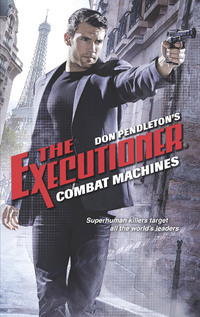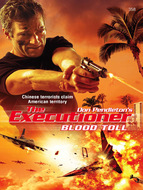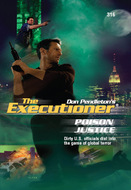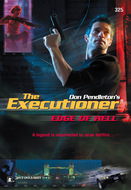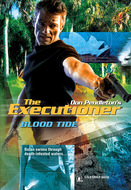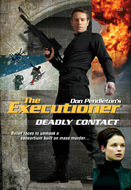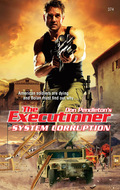Książki nie można pobrać jako pliku, ale można ją czytać w naszej aplikacji lub online na stronie.
Czytaj książkę: «Combat Machines»
KILLER OFFENSIVE
One by one, European leaders are dying by assassination. And each of the victims opposed Russia’s attempts to gain increasing power. Determined to stop this wave of terror before it hits American shores, Mack Bolan uses the killers’ next attack to flush them out. But these assassins are inhumanly fast, impervious to pain and programmed with cutting-edge combat skills by a hard-line Soviet scientist.
Now Bolan is being shadowed by a ruthless Russian intelligence team racing to bury him along with this rogue military project. To save a summit of world leaders, the Executioner must play two brutal factions against each other...and send the assassins’ creator to meet his maker.
“I think it fitting that you die here.”
The assassin hadn’t moved far, and Bolan seized the opportunity. Raising his smartphone, he triggered its camera, setting off the flash. The bright light blinded his adversary, and he staggered backward.
Bolan charged forward, intending to tackle him and take him down, but the man spun aside as he brought his fist down on the back of Bolan’s head, driving him to the ground, stunned.
The assassin bent and flipped Bolan over onto the tracks, staring into his face. “You will never find us. You will never stop us.” Then he took off again, racing toward an oncoming train.
Bolan tried to push himself up, tried to crawl to the narrow space next to the tracks, but his body refused to obey his commands. The train’s headlight was blinding, the thunder of its approach drowning out everything.
The Executioner’s last thought before blackness took him was that this was not how he’d expected to die...
Combat Machines
Don Pendleton

Obedience to lawful authority is the foundation of manly character.
—Robert E. Lee
Human beings often need an ideology to give their lives meaning and purpose. But unquestioning obedience to any doctrine is just as dangerous as having none at all. It can lead to terrible crimes committed in the name of these beliefs. And when that happens, that sort of ideology must be stopped—by whatever means necessary.
—Mack Bolan

Nothing less than a war could have fashioned the destiny of the man called Mack Bolan. Bolan earned the Executioner title in the jungle hell of Vietnam.
But this soldier also wore another name—Sergeant Mercy. He was so tagged because of the compassion he showed to wounded comrades-in-arms and Vietnamese civilians.
Mack Bolan’s second tour of duty ended prematurely when he was given emergency leave to return home and bury his family, victims of the Mob. Then he declared a one-man war against the Mafia.
He confronted the Families head-on from coast to coast, and soon a hope of victory began to appear. But Bolan had broken society’s every rule. That same society started gunning for this elusive warrior—to no avail.
So Bolan was offered amnesty to work within the system against terrorism. This time, as an employee of Uncle Sam, Bolan became Colonel John Phoenix. With a command center at Stony Man Farm in Virginia, he and his new allies—Able Team and Phoenix Force—waged relentless war on a new adversary: the KGB.
But when his one true love, April Rose, died at the hands of the Soviet terror machine, Bolan severed all ties with Establishment authority.
Now, after a lengthy lone-wolf struggle and much soul-searching, the Executioner has agreed to enter an “arm’s-length” alliance with his government once more, reserving the right to pursue personal missions in his Everlasting War.
Contents
Cover
Back Cover Text
Introduction
Title Page
Quote
Legend
Prologue
Chapter One
Chapter Two
Chapter Three
Chapter Four
Chapter Five
Chapter Six
Chapter Seven
Chapter Eight
Chapter Nine
Chapter Ten
Chapter Eleven
Chapter Twelve
Chapter Thirteen
Chapter Fourteen
Chapter Fifteen
Chapter Sixteen
Chapter Seventeen
Chapter Eighteen
Chapter Nineteen
Chapter Twenty
Epilogue
Extract
Copyright

Prologue
Mostar, Herzegovina
July 6, 1992
The distant, steady whistle and crumpf of artillery shells landing in the city scarcely bothered Andreja Tomić anymore. When the siege had first begun three months ago, she’d spent many exhausted, sleepless nights waiting for the next shell to land on the building she was living in. Now, however, the barrage’s constant din and its incipient danger had been relegated to the back of her mind, acknowledged, but not dwelled on. Not when she had so much work to do. Now, she was mostly just exhausted.
Mostar had been the scene of a pitched battle for control of the city and the surrounding area since that spring. The Yugoslav People’s Army, or JNA, had invaded in early April and seized control of a large portion of the city. A sustained counteroffensive by the Croatian Defense Council, or HVO, had pushed the JNA forces out of the town, but they had retaliated with their ongoing artillery barrage, which the HVO was replying to in kind.
At first, Andreja had feared for those under her care, but the JNA had seemed to be directing their fire on more valuable targets, at least in their minds. She had her doubts about that. In the past few weeks, the seemingly endless rain of munitions had claimed a Franciscan monastery, the Catholic cathedral and bishop’s palace. The destruction wasn’t all carried out by the JNA. After retaking the city, the HVO had demolished the Serbian Orthodox Monastery, as well as the Orthodox Cathedral Church that dated back to the mid-nineteenth century.
But the Kriva Cuprija, the Sloping Bridge, one of Mostar’s oldest man-made landmarks, still stood, spanning the Neretva River as it had for the past four hundred years. Every morning, when Andreja awoke, she looked out through the smoke and dust of the previous night’s bombardment to see if the white stone arch still stood, and every day when she saw it, she breathed a little easier. In a way, the old bridge was a symbol of the town—as long as it stood, then so would Mostar.
When she was little, Andreja’s grandmother, Marica, had told her stories of the destruction that had ravaged their nation during World War II, when the Ustaše, the Croatian Revolutionary Movement, had carried out a genocidal war against the Serbian population as well as Jews and the Romani in their attempt to create a “pure” Croat nation. Andreja remembered the nightmares she’d had from hearing those stories, and the fierce arguments between her grandmother and her mother. The older woman had stated that the next generations had to be prepared for the violence that was sure to return, while Andreja’s mother had shaken her head and dismissed her own mother’s claims, preferring to look ahead instead of back to the past.
As a child, Andreja hadn’t believed her grandmother. Now, however, she found it hard to remember any peaceful time. If the devastation inflicted on the city was anything close to what her grandmother had endured, Andreja didn’t know how anyone had survived it.
Now she was enduring it, as well. The worst parts were the intermittent utilities and constant food worries. With the city cut off from foreign aid and supply convoys, electricity, working sewer systems, food and water were in short supply. So far, they had been hanging on, but with the siege showing little sign of ending anytime soon, Andreja dreaded the day they would eventually run out, and she would have to begin making the next series of hard choices in a life that had already been filled with so many.
But for now, she had to begin taking care of her charges, and do whatever she could to see them through a new day.
She used a scant half liter of her allotted water ration to wash her face and hands, and had to be content with that for now—a bath or even a brief shower was a luxury she could not afford. She dressed in her uniform of a dove-gray, ankle-length dress with a yellowed apron over that, and twisted her long hair into a tight bun and tucked it under her white cap. Then she left her small house on the hill and walked down the path toward the main building, keeping her head down and her shoulders hunched over in anticipation of an errant shell landing nearby. When she reached the corner of the building with no harm done, she relaxed a bit and looked up—only for her mouth to fall open in shock.
A truck was parked in the driveway, a relatively new one, with a driver sitting behind the wheel. She didn’t know to whom it belonged, or what its occupants were doing here, but she intended to find out.
She entered the building’s foyer to find her two assistants anxiously awaiting her. Luka and Nenad were barely out of their teens, and had been pressed into service here when their families had been either captured or killed in the fighting. Andreja had taken them in and trained them to handle some of the crushing workload she had been managing alone until then.
Upon seeing her, the two young women hurried over. “Thank goodness you are here, Andreja!” Luka said, her words echoing around the bare room.
“Keep your voice down!” Nenad scolded. “You’ll wake them!”
“All right, calm down, both of you,” Andreja said, raising her hands for peace. “Who are our visitors? We have no one scheduled until the end of the week.” That was when, supposedly, more supplies were supposed to arrive from the HVO. They made it through about 50 percent of the time.
“He said his name is Dr. Rostislav Utkin, and that he is a scientist from the Soviet Union,” Luka said.
“You mean Russia,” Andreja replied. Although the USSR had broken apart almost three years ago, old habits died hard in the areas surrounding the former empire.
“Yes, she does,” Nenad said with an exasperated huff. “He said he wishes to inspect the children.”
Andreja’s dark brown eyes narrowed at that. “To what end? Are you saying that he wishes to adopt?”
Luka threw up her hands in confusion. “All he said was that he wished to inspect the children, and that he would wait for your arrival.”
Andreja glanced at her closed office door. “Well, then, let me go in and meet this Dr. Utkin, and find out what he has to say for himself. You two go and make the children as ready as you can. If all seems in order, we will join you shortly.”
The two young women nodded and crossed to a pair of large double doors on the other side of the room. Opening them just wide enough to slip through, they disappeared into the room beyond.
Taking a deep breath, Andreja squared her shoulders as she strode to her office door and opened it.
The room on the other side was small, just large enough for her compact desk, wheeled, creaky office chair, and two others in front of the desk. A dusty, battered file cabinet sat in one corner, its top drawer open. A man sat in one of the chairs in front of the desk, reading a file.
“What do you think you are doing?” she asked as she swept around the desk and snatched the limp manila folder from his hand. “These files are private. You have no right to read them.”
The seated man regarded her from behind wire-rimmed glasses. His light blue eyes appraised her, taking in everything from her simple dress to her drawn, pale face and the shadows under her eyes.
He spread his hands in a vaguely penitent manner. “Please excuse my intrusion,” he said in passable Bosnian. “I did not know how long I would have to wait, and well, I am afraid that my eagerness got the better of me.” He smiled, his thin, bloodless lips curving up and somehow softening the otherwise severe planes of his face. His white-blond hair was cut short enough that she could see his scalp through it.
“That is no excuse for barging in here and looking through whatever you wish.” She put the folder back in the cabinet and pushed the drawer closed, then walked around to stand behind her desk. “Now, why are you here, Dr. Utkin?”
“Straight to the point. I like that.” He leaned forward, his eyes gleaming. “Why, to adopt some children, of course.”
Andreja blinked. “Children?”
“Yes, I’m looking for at least twelve if possible, assuming they meet my criteria. Of course, this is not the only orphanage in the country, but given the growing troubles near Sarajevo and Zenica, I felt this one might be the best place to start.”
“Why would you wish to adopt twelve children?” Andreja asked as she sat, alarm bells sounding in her mind.
Utkin peered at her for a moment, then nodded. “Ah, of course. You are thinking that because I am from Russia I am procuring children for some sort of medical experiments or something. It is nothing like that. The Ministry of Health has authorized a long-term program to raise children who otherwise might not have the opportunity to become productive members of society, and give them such advantages to become so, and study how they develop over the years.”
Now Andreja frowned. “The Russian Ministry of Health wishes to adopt children from our country to raise in yours?”
Utkin spread his hands again. “That is pretty much the idea.”
“But why our children? Surely your country has orphans of its own that need homes?”
A brief smile flitted across the doctor’s thin lips. “Your concern for my people is touching. While it is true that there are parentless children in our country, they often have mitigating circumstances that already impact their early development for good or ill. For the purposes of this extended study, we wish to find infants with absolutely no previous attachments to people or places. Blank slates, if you will pardon the expression. They will be very well cared for and have everything they need provided. They will receive a first-rate education, access to the best health care and a structured environment that will, hopefully, allow them to grow up to reach their full potential.”
“And you believe that you are taking these children from a negative situation and placing them into a more positive situation in your own country?”
He nodded. “Miss Tomić, I am aware of the circumstances under which the children in your facility were conceived. I know what kind of life they have to look forward to without intervention from somewhere—wards of the state, with mothers that reject them and unknown fathers. Shuttled from state facility to perhaps a foster home to another facility, never receiving the care and education they so desperately need—and which we are willing to provide.” He leaned forward and smiled, the expression lighting up his severe expression. “You need help here. We are willing to help. Please...let us help you.”
It was that last part that finally removed Andreja’s resistance—the feeling that he truly cared about what would happen to these children. “Why don’t we take a walk into the ward, and you can have a look at the babies?”
“I would like nothing more,” he replied as he rose to his feet.
Andreja walked with him out of her office and across the foyer to the double doors. She gently pushed them open and peeked inside.
Luka and Nenad were busy among the more than three dozen cribs, efficiently changing diapers. The rustling of their clothes and of the cloth diapers was the only sound in the room. None of the infants made a sound.
Dr. Utkin nodded pleasantly to her assistants, then focused on the four rows of children, ranging in age from six to eighteen months. He began walking up and down the rows, leaning over to examine this child or that.
A shell arced overhead with a scream, then detonated close enough to rattle the windows. Even then, not a single baby uttered a sound.
“I have heard of this, da?” Utkin asked. “Since the children do not get comforted when they cry, they learn to not cry, as it does them no good.”
“I’m afraid so,” Andreja replied.
“It sounds cruel, but this actually works better for our program,” Utkin said, clasping his hands behind his back as he walked. “We will be examining their ability to form relationships later on in life, after having those needs withheld as infants. It is said that the brain develops differently under such adverse conditions, and we will find out if that is so, and how it manifests later on...”
He turned to see the grim expression on Andreja’s face and reached out to touch her shoulder. “Of course, I did not mean that you and these young ladies are responsible for their development. You are doing all that you can, of course.”
“Yes...it is not easy,” she replied. “We should continue your tour.”
“Yes, of course.” Utkin walked up and down every aisle, looking at each child. At length, he came to the end of his inspection. “Are there any more?”
“No, thank heaven.”
“Very well. I have made my selections.” Utkin began walking up and down the aisles again, stopping briefly at a dozen cribs, each one just long enough for Andreja to note which one it was before he moved on to the next. In just a few minutes, the tall, lean scientist had chosen more than a quarter of her current children.
“Very well. They can be ready for travel by this afternoon.” Andreja cleared her throat. “I assume that you have brought the necessary supplies? We cannot spare anything to send with you.”
Utkin nodded. “I understand. We brought all that is necessary for their safe and healthy journey back to Russia. After all, they represent a substantial investment on the part of the motherland. It would be terrible if something happened to them before they arrived in their new home.”
“Well, while Luka and Nenad are preparing the children, you and I can head back to my office and begin the paperwork for all this. Twelve sets. I’m afraid you’re going to be here awhile.”
“That’s quite all right,” Utkin said with a smile. “I want to make sure everything goes smoothly for them from this point forward.”
* * *
FOUR HOURS LATER, with the paperwork completed and the dozen babies safely loaded into infant seats secured inside the truck, Utkin extended his hand to Andreja, which she took.
“Thank you for your assistance. Given the circumstances, I’m so very pleased that it went as easily as it did.”
“And thank you, Doctor. I certainly hope that you will be able to give them a better life. Although I would like to know how your experiment turns out, I will be content just knowing that they escaped this place.”
The doctor nodded. “Yes, together we have saved twelve lives today. They and I owe you our thanks.”
“No, it is you who has our thanks. They are the recipients of your generous offer, and I know they will do well by it.”
Utkin nodded even as he checked his watch. “I’m afraid, however, that we must be going. It will be difficult enough moving through the checkpoints, and exiting the country with twelve infant children that I didn’t have upon my arrival, we probably won’t get out of the country for a week with all the paperwork that will have to be examined.”
Andreja smiled and nodded. “Of course. Go with God, and safe travels.”
“Thank you.”
With that, the doctor climbed into the passenger seat of the truck as the driver started it up.
“Get what you came for?” the driver, Utkin’s assistant and bodyguard, asked around a cigarette he lit.
Utkin glanced back over his cargo, the twelve children sitting silently in their car seats. Any trace of the kindly social scientist had disappeared the moment he’d gotten into the vehicle. Now he regarded the children coldly, dispassionately, as if they were rats in a cage.
“Oh, yes, Dimitri,” he murmured. “They will do perfectly.” He turned to face the front of the vehicle again. “You radioed in the coordinates, yes?”
The driver nodded. “As requested. In fact, they should be reducing that building to rubble right...about...now.”
“Yes, with all records lost as a result of an unfortunate accident.” Utkin grinned, a wolfish smile with no humor in it whatsoever. “You are very fortunate, Dimitri. Not many people get to witness history being made firsthand.”
The other man grunted, jetting smoke out of his nose.
“Yes, for you see, the new vanguard of Russia’s soldiers is beginning today.” Utkin swept an arm back to encompass the dozen children. “And these will be the first of many.”
